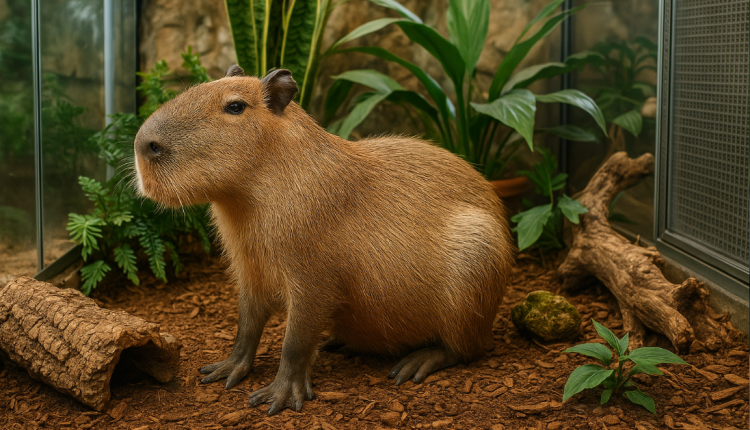The Ethical Evolution of Exotic Pet Ownership
In 2025, the realm of exotic pet ownership is undergoing a significant transformation. With growing awareness about animal welfare, environmental sustainability, and the complexities of caring for non-traditional pets, enthusiasts and prospective owners are reevaluating their choices. This shift is not only influencing individual decisions but also prompting changes in regulations, breeding practices, and consumer behavior. This article delves into the current landscape of exotic pet ownership, highlighting the trends, challenges, and ethical considerations shaping the industry today.
The Rise of Ethical Sourcing and Captive Breeding
One of the most notable developments in exotic pet ownership is the emphasis on ethical sourcing. Captive breeding programs have gained prominence, aiming to reduce the demand for wild-caught animals. These initiatives help protect endangered species from overcollection and preserve delicate ecosystems disrupted by poaching. In the United States, for instance, new laws are addressing illegal wildlife trade, ensuring that exotic pets are sourced responsibly. The Endangered Species Act (ESA) and CITES agreements are driving stricter oversight, making it easier for owners to choose ethically sourced animals.
Technological Innovations in Exotic Pet Care
Advancements in technology are revolutionizing the way exotic pets are cared for. Smart enclosures equipped with energy-efficient heating and lighting systems now mimic natural habitats while reducing energy consumption. Automated feeders deliver precise portions, minimizing waste and ensuring consistent nutrition. Additionally, pet care apps provide tools to monitor health, care schedules, and eco-friendly product recommendations, ensuring responsible ownership.
The Influence of Social Media and Pop Culture
Social media platforms like TikTok and Instagram have played a significant role in popularizing exotic pets. Animals such as capybaras and axolotls have become internet sensations, leading to increased demand for these species as pets. While this trend has brought attention to unique animals, it also raises concerns about the implications of keeping wild animals as domestic pets. Experts argue that the popularity of exotic pets can overshadow the animals’ welfare needs and promote superficial engagement with animals.
Regulatory Measures and Legal Considerations
Governments worldwide are implementing stricter regulations to address the challenges associated with exotic pet ownership. In the United States, the Captive Wildlife Safety Act bans the sale or transport of big cats across state lines for the pet trade. Additionally, many states have specific laws governing the ownership of exotic animals, requiring permits or outright prohibiting certain species. These measures aim to protect both the animals and the public from potential harm.
Health Risks and Zoonotic Diseases
Owning exotic pets can present health risks to humans and other animals. Many exotic animals carry zoonotic diseases, which can be transmitted from animals to humans. Salmonella infections from reptiles and amphibians, as well as the risk of contracting diseases like rabies and monkeypox from other exotic creatures, highlight the potential dangers involved. Moreover, some exotic animals can pose physical dangers due to their size, strength, or venom. Such incidents not only threaten human safety but also lead to increased scrutiny and stricter regulations, which in turn affect the exotic pet industry and animal welfare.
The Importance of Habitat Simulation
Creating an environment that closely mimics an exotic pet’s natural habitat is crucial for their psychological and physical well-being. Proper habitat simulation can prevent many common health issues associated with stress, such as feather plucking in birds or refusal to eat in reptiles. To achieve this, owners must consider temperature and humidity levels specific to their pet’s natural environment, appropriate substrates and bedding materials, and naturalistic decor and hiding places. Lighting also plays a significant role, especially for reptiles that require UVB lighting to synthesize vitamin D3, essential for calcium absorption and overall health.
Public Education and Community Support
Education and awareness are vital components in promoting ethical exotic pet ownership. Pet owners today have more access than ever to expert knowledge on exotic pet care, thanks to online courses, webinars, and advocacy from veterinarians and wildlife organizations. Prospective owners are encouraged to thoroughly research the needs of their chosen species, ensuring that they can provide proper care. Additionally, online forums, social media groups, and local meetups foster a sense of community where pet owners exchange ideas on ethical practices and sustainability.
Conclusion
The landscape of exotic pet ownership in 2025 reflects a growing commitment to ethical practices, sustainability, and animal welfare. As technology advances and public awareness increases, the hope is that these positive trends will continue, ensuring that exotic pets are cared for responsibly and that their wild counterparts are protected for future generations.

